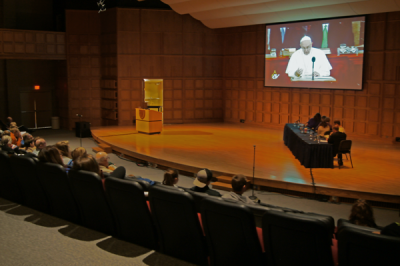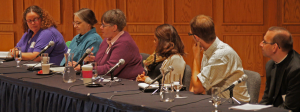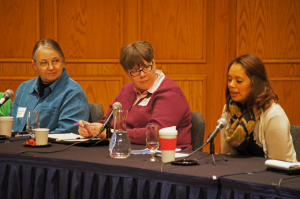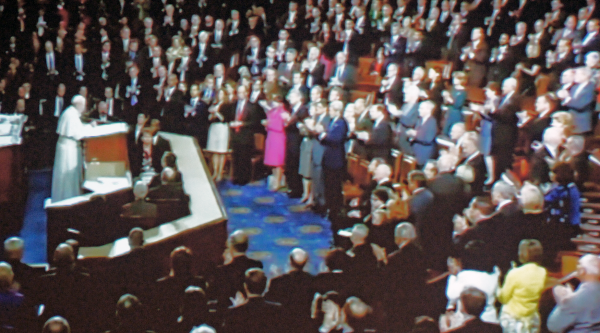
On September 24, Pope Francis spoke to Congress about what America can do to further the common welfare. Many Sisters went down the cloister walk to The College of St. Scholastica to watch a live feed of the speech. Afterwards a panel on the stage shared their impressions and answered questions. Panelists were Sister Edith Bogue of our Community, CSS student Ixayana Gonzalez, Rev. Joel Hastings from St. Benedict Parish in Duluth, Nathan Langer, CSS director of Campus Ministries, Patrice Critchley Menor, director of the Duluth Diocese’ Office of Social Apostolate, and Denise Starkey, chair of theology and religious studies at CSS.
Pope Francis spoke at length about four American men and women who embodied what is best about our country.
Abraham Lincoln saw that freedom requires a commitment to the common good of all. In our own day, violence and hatred tears apart countries, and atrocities are committed even in the name of God. “The contemporary world … demands that we confront every form of polarization which would divide it into two camps. In the attempt to be freed of the enemy without, we can be tempted to feed the enemy within. To imitate the hatred and violence of tyrants and murderers is the best way to take their place.” Our attitude must be of hope, healing, peace and justice, and a willingness to operate generously for the common good.

Martin Luther King gave his life for the rights of the individual. Pope Francis described America as a land of dreams that lead to action, conviction and commitment. We should not fear foreigners, for most of us, a few generations back, were foreigners. ”Our world is facing a refugee crisis of a magnitude not seen since the Second World War. Thousands of persons travel in search of a better life for themselves and for their loved ones, in search of greater opportunities. Is this not what we want for our own children? We must not be taken aback by their numbers, but rather view them as persons, seeing their faces and listening to their stories, trying to respond as best we can to their situation, to respond in a way which is always humane, just and fraternal.” Pope Francis warned against taking the easy way out by shrugging off whatever is troublesome.
“In a word, if we want security, let us give security; if we want life, let us give life; if we want opportunities, let us provide opportunities. The yardstick we use for others will be the yardstick which time will use for us. The Golden Rule also reminds us of our responsibility to protect and defend human life at every stage of its development.”

Dorothy Day recognized the social inequity that is an integral part of our unfettered market economy. Pope Francis asked us to consider another concept of economics: “The right use of natural resources, the proper application of technology and the harnessing of the spirit of enterprise are essential elements of an economy which seeks to be modern, inclusive and sustainable.’ He quoted his recent encyclical, Laudato Si: “Business is a noble vocation, directed to producing wealth and improving the world. It can be a fruitful source of prosperity for the area in which it operates, especially if it sees the creation of jobs as an essential part of its service to the common good.”
Thomas Merton, a Trappist monk, was a man of contemplative prayer, “… a thinker who challenged the certitudes of his time and opened new horizons for souls and for the Church. He was also a man of dialogue, a promoter of peace between peoples and religions.” Pope Francis believes the path of salvation for this world is open, respectful and compassionate dialogue. “It is my duty to build bridges and to help all men and women, in any way possible, to do the same. When countries which have been at odds resume the path of dialogue, new opportunities open up for all. This requires courage and daring, which is not the same as irresponsibility. … A good political leader always opts to initiate processes rather than possessing spaces.”
“Three sons and a daughter of this land, four individuals and four dreams: Lincoln, liberty; Martin Luther King, liberty in plurality and non-exclusion; Dorothy Day, social justice and the rights of persons; and Thomas Merton, the capacity for dialogue and openness to God.”

